#about neruda and borges
Explore tagged Tumblr posts
Text

Reading books within books
"When writers die they become books, which is, after all, not too bad an incarnation." Jorge Luis Borges
68 notes
·
View notes
Note
do you have any book recommendations for us :D
MAYBE SO.......!!!! u know i love talkin abt books!!!
well, ok since ive posted about most of the books ive been reading recently MAYBE i can also post about some that i ordered and am waiting to arrive??? because all of these sounded very interesting to me!!!
SO books i have coming in the mail:
surrealist novels:
the woman in the dunes by kobo abe
the hearing trumpet by leonora carrington
the melancholy of resistance by laszlo krasznahorkai:
the third policeman by flann o'brien
nadja by andre breton
(been really into surrealism lately if it isn't apparent. most excited for melancholy of resistance i think)
horror, gothic, etc:
bruges-la-morte by georges rodenbach
the damned (la-bas) by joris-karl huysmans
floating dragon by peter straub
classics, short stories, etc:
french decadent tales (oxford world's classics) by stephen romer
in watermelon sugar by richard brautigan
swann's way (in search of lost time, #1) by marcel proust
selected short stories by balzac
icefields by thomas wharton
some ive picked up recently & stoked to read:
ada, or ardor by nabokov (my most beloved author of all time)
carmilla by le fanu
nightmare alley by william lindsay gresham
a king alone by jean giono
twilight of the idols by nietzsche
transparent things by nabokov
dark water by koji suzuki
selected poems by jorge luis borges (also beloved)
trolled my goodreads for more recs
books ive read & enjoyed so far this year:
the iliac crest by cristina rivera garza
the tenant by roland topor (FAV!!! huge fav)
crimson labyrinth by yusuke kishi
pedro paramo by juan rulfo
carolina ghost woods by judy jordan
death in her hands by ottessa moshfegh
the unbearable lightness of being by milan kundera
in the lake of the woods by tim o'brien
disgrace by j m coetzee
goth by otsuichi
books i enjoyed from last year:
the lottery & other stories by shirley jackson
the vegetarian by han kang
rosemary's baby by ira levin
piercing by ryu murakami (an all time fav)
the bloody chamber by angela carter (fav)
starve acre by andrew michael hurley (also a fav)
the glassy, burning floor of hell by brian evenson
the devil's larder by jim crace
monstrilio by gerardo samano cordova
and as a bonus, literally anything by nabokov. i have a big book of his short fiction that ive been reading slowly for a long while. despair by him is my fav book of all time, hands down. he is a master of absurdism (and a master of every language he writes in).
ALSO!!!! if youre into poetry, anything and every single thing by: t.s. eliot, baudelaire, rimbaud, borges. i also love neruda's poetry but i have heard he was an awful man so keep that in mind
#thotbox#thotmail#talky cherub#library cherub#i buy 95% of my books secondhand#i have something of a problem but i figure books are not the worst addiction one can have.....OOPS
47 notes
·
View notes
Text


is that MACARENA ACHAGA ? oh, no, that’s MARISA IRIGARAY, a TWENTY-NINE year old SALES ASSOCIATE AT INHERITED ESCAPES AND ASPIRING POET who uses SHE/HER pronouns. they currently live in CASABLANCA, and the character they identify with most is PENNY LANE FROM ALMOST FAMOUS. hopefully they find their own little paradise here in el país de los poetas!

//:: T H E B A S I C S
name: maria isabel irigaray lombardi
nickname(s): marisa
age: twenty-nine
gender: cis woman
place of birth: colonia, uruguay
birthday: march 14th, 1994
zodiac : pisces sun, capricorn moon and leo rising
height: 5′7″
occupation: sales associate at inherited escapes and aspiring poet
//:: T H E B I O G R A P H Y
tw: abandonment
maria isabel "marisa" irigaray was born in colonia, uruguay, and spent the initial five years of her life there before her family relocated to montevideo. born into a family with a banker father and a receptionist mother, marisa's upbringing was shaped by her parents sacrificing their dream careers for a more secure livelihood. while her father came to terms with the curtailment of his musical aspirations, her mother, an aspiring painter, struggled to move past the relinquishment of her artistic dreams. over time, her mother harbored resentment towards her husband and children for the role they played in truncating her ambitions.
despite her mother's usual cold and distant demeanor, there were instances when, under the influence of alcohol, she would engage in lengthy conversations with marisa about the profound significance of art. ironically, these intoxicated moments with her mother ignited a curiosity for art within marisa. she experimented with various forms, including painting, singing, and sculpting, but ultimately discovered her true calling in the realm of words.
at the age of eight, marisa's mother reached a breaking point and chose to abandon the family. devastated by this abandonment, marisa's father, though successful in providing a comfortable life financially, became immersed in work and frequently neglected his two children emotionally.
at 18, she attended university, majoring in literature. it was in her junior year that she seized the opportunity to spend a semester as an exchange student in valparaiso. it was during this time that marisa developed a deep affection for the city and vowed to return someday.
after completing her studies back in uruguay, she graduated and worked as a teacher for a few years. simultaneously, she dedicated her free time to crafting poems and actively sought a publishing house for her work.
one year ago, she made the bold decision to relocate to valparaiso. opting for a less demanding job than teaching, she sought a position at a bookstore, allowing her more time for writing. embracing a modest lifestyle, she now resides in the city.
//:: H E A D C A N O N S
marisa holds a special affinity for mario benedetti's "la tregua," making it her favorite book. additionally, she admires the works of horacio quiroga and jorge luis borges. among her preferred poets are gabriela mistral, rosario castellanos, sylvia plath, and pablo neruda.
influenced by her father's musical tastes, marisa grew up immersed in spanish rock, with a particular fondness for bands like soda stereo, héroes del silencio, and caifanes.
her upbringing also instilled in her a love for cooking, a skill passed down by her mother from their italian immigrant roots. marisa takes pride in her ability to prepare homemade pasta, with cannelloni being her signature dish.
her early education included attending an italian school, but her proficiency in the language has diminished over time since her mother's abandonment. despite being a bit rusty, she still retains some knowledge of italian.
while marisa often mentions "before sunrise" as one of her top 5 favorite movies, her true favorite is "mamma mia!"
unbeknownst to many, she harbors a fear of water due to a childhood accident at the age of five, which prevented her from learning how to swim. she keeps this detail private, sharing it with only a few people.
5 notes
·
View notes
Note
Are there any authors that influence your work? Your writing is very poetic
Oh my!
Thank you for the ask and curiosity. It’s sweet. There aren’t many authors that influence my writing at current moment, but I am the vessel of everything I’ve read in the past. This is by no means is me gate-keeping. I’ve developed my own voice and style from years and years of tweaking my writing as an individual whose main communication was the way of text (thank you disability).
But I can tell you the authors, the poets that did influence me when I was an itty bitty 16 year old, getting more and more into writing. These are the authors, the essayist, the beloved poets of the world that I’ve fell in love with a long time ago to be a mosaic of their influence. Now this is where my list of favorite literary delights from my teen years comes in handy:
(Under the cut because it got long by my standards. I just have so many favorites and influences from the time period where I had so much time to slaughter. I was a homeschool kid, almost didn’t finish high school if you can believe.)
Any books by Catherynne M Valente, but specifically Deathless. She’s a favorite of mine. I’ve dabbled in reading Hélène Cixous, Vladimir Nabokov, Pablo Neruda, Sylvia Plath, Jean Rhys, Dr. Maya Angelou, Isabel Allende, João Guimarães Rosa, Mary Karr and Jorges Luis Borges. Emily Dickenson is another favorite as is Anne Carson.
Pablo Neruda has this iconic quote: “As if you were on fire from within / The moon lives in the lining of your skin.” Sounds familiar for ships, huh? Cough cough. Shuate.
It’s all about reading to grow the voice, though I’ve lost my passion for it. But ultimately, to tell you the truth, I was obsessed with themes and archetypes. I love space, I love the toxicity of codependency, I love allegories as a literary nerd. I love fantasy, but more specifically the promise of otherness in another form of religion depicted. I love blasphemy as a vehicle for defiled divinity.
My latest read was Fyodor Dostoevsky’s Crime and Punishment. This actually inspired a massive piece on disability rights movement. Thank you to my favourite rp partner for recommending it and reviving my interest in this author. ✨
#;ooc#;ask answered#;ask#you are so sweet for taking an interest in this#I may not have any current influences but I’m a mish mash of everything I loved as a teen#it’s getting further and further away but those years were formative.
0 notes
Note
hey!! I have a question for you, do you have any like really difficult/high-level spanish books that you could recommend or maybe your followers could recommend?? also similarly, like high-level poetry, high-level songs (I usually only hear songs that are relatively easy to understand). Also for the books/poetry, I would definitely be more willing to read something with an interesting plot. I'm open to all genres of everything. Thank you so so much if you have recommendations
I'll try and think of some, though the ones I know of tend to be older and more difficult just because they're old but I'll try and think of some that are more famously difficult or advanced that are more contemporary.
Aside from technical things that even I don't understand because of the specialized vocabulary I would recommend:
La vida es sueño by Calderón de la Barca [Calderón is a very famous Spanish playwright during the Spanish Golden Age, though his works tend to be more geared towards the upper class at the time, but La vida es sueño is probably his best known work]
Comentarios reales de los Inca by El Inca Garcilaso de la Vega [An extremely important work; El Inca Garcilaso de la Vega was one of the first mestizos, a son of a conquistador and an Inca princess and he wrote about the Inca Empire and the history of Peru to explain how the Inca Empire worked because the Spaniards didn't really understand the culture or customs and sort of saw themselves as above anyone they conquered]
Don Quijote by Cervantes [Very famous, very long, old usages of words and depending on your version it can be very strange to read; I'd recommend a newer edition of it only because the older ones have spelling differences that make it hard to understand; I'm talking like people saying fazer instead of hacer]
Cien años de soledad by Gabriel García Márquez El general en su laberinto El ahogado más hermoso del mundo El amor en los tiempos del cólera [Cien años is very famous and famously advanced; find one with a family tree because you'll be consulting it a lot, as the names tend to repeat and that's for a reason; I’m also attaching some of his other works that are particularly well-known]
El jardín de senderos que se bifurcan by Borges [This story is notoriously difficult. Even if you understand the words, the whole story is confusing and if you read it and got confused, you read it correctly. It's very trippy]
El libro de arena by Borges [A collection of short stories, also difficult in places]
El Cantar de mio Cid by Anonymous [Possibly one of the oldest and most important works in Spain's history, El Cid was a very popular figure in Spanish literature; in history during the 11th century El Cid was a battlemaster who fought and conquered different cities in Spain before Spain was unified and was in taifas and caliphates, and in literature he was more of a mythic figure where he also fights the King of Morocco
Hombres necios que acusáis by Sor Juana Inés de la Cruz. [Have you ever wanted to read feminist slam poetry from the 1500s? Sor Juana is who you want to read]
Poetry by Santa Teresa de Ávila [A little on the simpler side of poetry for being so old, but still really good especially Muero porque no muero which makes sense if you consider that she’s a very religious person highly tied to the mystic tradition and ecstatic traditions of Catholicism]
Assorted works by Rubén Darío [Relatively modern, but his poetry is really great. I particularly like A Roosevelt, El cisne, or El rubí]
The poetry of Pablo Neruda [Very famous for his “Odes”]
El laberinto de la soledad by Octavio Paz [He’s also a really well-known poet. His book is about Mexican culture and it’s kind of more like an essay but it’s really engaging]
Rayuela by Julio Cortázar La noche boca arriba [Cortázar is very well-known and prolific]
El almohadón de plumas by Horacio Quiroga La gallina degollado Los desterrados Cuentos de amor de locura y de muerte El crimen del otro Cuentos de la selva [Quiroga is very well-known for his short stories and collections of short stories. Probably the best known is El almohadón de plumas though]
El burlador de Sevilla y el convidado de piedra by Tirso de Molina [Very very well-known and really interesting; it’s one of the major dramas about Don Juan the famous womanizer but this is the one where he gets his comeuppance]
La casa de Bernarda Alba by Federico García Lorca [Technically a play, but if you can find the script to read it’s very interesting. García Lorca is also very well-known for his poetry and is a very famous figure in Spain]
La casa de los espíritus by Isabel Allende [Isabel Allende is extremely well-known and La casa de los espíritus is her most famous work. She also has other works and is still alive so she’s very contemporary; La ciudad de las bestias and Eva Luna and La isla bajo el mar are just a few of her works]
I’m also going to attach a link to Biblioteca Ciudad Seva which is a great way to find different writers and poets, both from Spain and Latin America, as well as authors who were translated into Spanish. As in you could read some of the famous plays like Fuenteovejuna... or you could read the Spanish translation of Oedipus Rex
I would also suggest the Spanish language options on the Gutenberg Project; some are older writers, some are translations of things
If anyone has any other ideas, please add them in the comments below!
101 notes
·
View notes
Note
When you are less busy, will you tell us your thoughts on the latam nations? Perhaps favourite or least favourite character, preferred pairings, and/or anything that you think sets the whole latam club apart? Tyyyy <3
Hi! <3
Gonna put this under a read more haha
First off, I think it's important to acknowledge the hard work people in the Latin Hetalia fandom has put into these characters throughout the years. The original lj community is still up with all the character infos, and there's an official tumblr as well (in Spanish). There are some amazing fanartists and ficwriters in the fandom and the tags are usually "lh [name of the country]", or "lh: [name of the country]".
My favorite character would have to be Brazil XD who is also my least favorite XDD
No, but in all seriousness, I like Brazil and l like his portrayal in the fandom. There are a lot of good fics out there!
My favorite ship dynamics are between Brazil/Uruguay/Argentina, but I've read a fic that had Brazil/Mexico as a side pairing and that was good too. If a fic has Brazil in the tags I'm immediately 👀
My Spanish is still not all that great, so I haven't really read a lot of the other latam fics, but I know the Ecuador/Peru community is pretty big, and the Colombia/Venezuela is as well (I like to look at all the pretty art (.❛ ᴗ ❛.)).
haha maybe what sets us apart is shared trauma? XD Not only were we all colonized by Iberian countries (which themselves share a lot of similarities), but we also share indigenous roots, such as here in the South of Brazil, Uruguay, Paraguay and parts of Argentina, from whom we inherited our taste for drinking mate and terere.
A great book about Latin America and its connections is Open Veins of Latin America, by Eduardo Galeano. There's also of course all the great writers, like Isabel Allende, Pablo Neruda, Gabriel García Marquez, Jorge Luís Borges, Lima Barreto.
We all suffered with coups and US/European interference in our politics, and we all share that. We understand each other in some level.
And we also love soap operas and communicate through memes hahaha what's not to love?
#thank you for the ask 🥰❤️#rein-ette#also beware of the us adaptation of house of spirits#the book is 100 times better aaaand not whitewashed#saudade de uma cumbia na rua ;_;
13 notes
·
View notes
Text
mega-list of book recommendations
saw a mega-list of literary recommendations going around recently and was struck by the dearth of titles by poc, so i made a list of just poc titles to course-correct. keep in mind that i can only in good faith recommend what i’ve read, so i’m sure i’ve absolutely missed some integral titles. drop me an inbox message if you have more recs, i’m always open
canonical
the narrative of frederick douglass - frederick douglass
incidents in the life of a slave girl - harriet jacobs
the souls of black folk - w.e.b. dubois
montage of a dream deferred - langston hughes
cane - jean toomer
their eyes were watching god - zora neale hurston
the bean eaters - gwendolyn brooks
a raisin in the sun - lorraine hansberry
invisible man - ralph ellison
native son - richard wright
the autobiography of malcolm x - malcolm x
the fire next time - james baldwin
sister outsider: essays and speeches - audre lorde
things fall apart - chinua achebe
the garden of forking paths - jorge luis borges
one hundred years of solitude - gabriel garcia marquez
the color purple - alice walker
the woman warrior - maxine hong kingston
satanic verses - salman rushdie
beloved - toni morrison
sula - toni morrison
the house on mango street - sandra cisneros
the joy luck club - amy tan
DAMN. - kendrick lamar
plays
a tempest - aime cesaire
for colored girls who have considered suicide / when the rainbow is enuf - ntozake shange
fences - august wilson
dutchman - amiri baraka
the american play - suzan-lori parks
memoir
the light of the world - elizabeth alexander
how we fight for our lives - saeed jones
between the world and me - ta-nehisi coates
persepolis - marjane satrapi
men we reaped - jesmyn ward
heavy - kiese laymon
black boy - richard wright
the yellow house - sarah m broom
brothers and keepers - john edgar wideman
zami: a new spelling of my name - audre lorde
poetry
american sonnet for my past and future assassin - terrance hayes
the tradition - jericho brown
night sky with exit wounds - ocean vuong
citizen: an american lyric - claudia rankine
twenty love poems and a song of despair - pablo neruda
don’t call us dead - danez smith
eye level - jenny xie
life on mars - tracy k smith
a fortune for your disaster - hanif abdurraqib
postcolonial love poem - natalie diaz
i can’t talk about the trees without the blood - tiana clark
i wore my blackest hair - carlina duan
an american sunrise - joy harjo
oculus - sally wen mao
short stories
her body & other stories - carmen maria machado
interpreter of maladies - jhumpa lahiri
exhalation - ted chiang
ficciones - jorge louis borges
what is not yours is not yours - helen oyeyemi
sour heart - jenny zhang
essays
how to write an autobiographical novel: essays - alexander chee
trick mirror - jia tolentino
bad feminist - roxane gay
they can’t kill us until they kill us - hanif abdurraqib
we were eight years in power: an american tragedy - ta-nehisi coates
borderlands/la frontera: the new mestiza - gloria anzaldua
this bridge called my back: writings by radical women of color - ed. cherrie moraga and gloria anzaldua
white girls - hilton als
non-fiction
the new jim crow: mass incarceration in the era of colorblindness - michelle alexander
stamped from the beginning: the definitive history of racist ideas in america - ibram x kendi
bunk: the rise of hoaxes, humbug, plagiarists, phonies, post-facts, and fake news - kevin young
an alchemy of race and rights - patricia j williams
looking for lorraine: the radiant and radical life of lorraine hansberry - imani perry
the next billion users: digital life beyond the west - payal arora
fiction
passing - nella larson
caucasia - danzy senna
trust exercise - susan choi
on earth we’re briefly gorgeous - ocean vuong
corregidora - gayl jones
the fifth season - nk jemisin
the brief wondrous life of oscar wao - junot diaz
the round house - louise erdrich
there, there - tommy orange
little fires everywhere - celeste ng
the supervisor - viet than nguyen
kindred - octavia butler
the known world - edward p jones
the underground railroad - colson whitehead
the god of small things - arundhati roy
the vegetarian - han king
theory
playing in the dark: whiteness and the literary imagination - toni morrison
black skin, white masks - frantz fanon
mama’s baby, papa’s maybe: an american grammar book - hortense spillers
discourse on colonialism - aime cesaire
scenes of subjection - saidiya hartman
the signifyin(g) monkey - henry louis gates jr
pedagogy of the oppressed - paulo freire
feminist theory: from margin to center - bell hooks
black noise: rap music and black culture in contemporary america - tricia rose
decolonizing the mind: the politics of language in african literature - ngũgĩ wa thiong’o
black marxism: the making of the black radical tradition - cedric robinson
black feminist thought: knowledge, consciousness, and the politics of empowerment - patricia hill collins
black and blur (consent not to be a single thing) - fred moten
young adult
diary of a part-time indian - sherman alexei
the hate u give - angie thomas
emergency contact - mary hk choi
i am not your perfect mexican daughter - erika sanchez
poet x - elizabeth avecedo
#book recommendations#literature#book list#dark academia#poc writers#litblr#writeblr#light academia#academia#dark academia aesthetic#lit recs#book recs#feat. a disproportionate amount of AfAm bc it’s my subfield#bookblr#of foolish and wise#tori recommends#important#favorite post#dark academia post#dark academia aesthetics#blog vibe
455 notes
·
View notes
Text
limits of desire⤳t.h.||7
chapter 7: hire vendors
story summary: you met Tom a night he was trying to sleep with you, it didn’t work and you became best of friends. Wedding bells might be ringing for when you both realize what you really feel.
summary:the one when someone gets on one knee
pairing: fuckboy!tom holland x best friend!reader
warnings: swearing,alcohol mention, didn’t proof read, poetry, miguel, lizzie
word count: 5.9k
previous chapter
next chapter
series masterlist
wanna be tagged?

When Tom, at last, knew the answer, y/n had a different question. Maybe it had taken him too long. But it wasn’t like he hadn’t hinted it. But they belonged together. Didn’t they?
But 6 months was a long time, and time knew no mercy. But it didn’t make any sense. All was lost. He had lost the battles, the war. It had been his mistake, he didn’t choose whom he was supposed to choose. She was, after all, the one who chose him before anything and everything.
And who was this y/n? He had changed her. She was there reciting poetry, not like she had never recited poetry. But it was different. Talking about Borges, Cortazar and Neruda. Like she could only speak in poetry to Miguel.
“Surprise!” The people yelled as soon as Tom, Y/N, and Miguel had stepped into Tom and Harrison’s place. The ride hadn’t been pleasant either. She had driven, claiming Tom had drunk a little too much. Miguel was copilot, and had been kissing her hand and pointing everywhere. With that silly accent of his.
Just to add more to Tom’s hell of a night, he had forgotten about the surprise welcome party he had planned for y/n. Of course, this wasn’t how he had pictured arriving. If it were for him, he’d already had his arm around her, placing kisses on her cheek and neck, just finally enjoying her presence. Probably triumphantly, maybe even announcing they were finally a couple.
However that dream wasn’t even near happening, instead, he was watching Miguel’s perfect hand posing on y/n’s shoulder, delicately as she hugged him with fake surprise, as their friends were running over to her.
Her hand was on Miguel’s chest, showing off the big engagement ring embracing her finger and her smile was the brightest. Her nose was slightly red, and even freckled. And the cold from London was accentuating her blushing cheeks. She looked perfect. How dare she even look that way. Now that Tom couldn’t have her.
Harrison widened his eyes and frowned as he looked at her and Miguel, he raised an eyebrow at Tom, who was tipsy enough already but just gave him a shrug. Harry, Sam, and Tuwaine were as confused. Tom wanted to hit his head against the wall, repeatedly.
Lizzie, Hannah, and Jess jumped over to y/n and screamed. Some other friends approached her to meet with her, while she introduced them to Miguel. Miguel was incredibly and annoyingly handsome and nice with everyone.
So y/n continued to say hello to her friends and to enjoy the party. Between her and Miguel they were stealing all the spotlight, making everyone laugh with their adventures.
Tom left the party to go to his room, he needed to process it. From one day to another she was engaged. Y/N was engaged. The woman he was deeply in love with was engaged with another man. He went straight to his bathroom to wash his face. He just couldn’t believe it. He stared at his reflection as if trying to come up with an answer, trying to wake up; he pinched himself trying to get out of this terrible nightmare. He then dug his pocket and took out the small blue box.
He pinched the bridge of his nose, as he sat down. He didn’t even want to open it. Why had he bought it?
A knock was heard on the door, Tom quickly shoved the blue box into his drawer. The door opened to reveal a very confused Harrison.
“Who the hell is that?” Asked Harrison, with a frown.7
Tom didn’t answer.
“Man! I thought that you were supposed to arrive with her bridal style or whatever, what the hell happened?”
“Miguel happened.” Tom pinched the bridge of his nose as he was getting a very unpleasant headache.
“Who the hell is he?” Harrison asked.
“A jerk.”
Harrison rolled his eyes. “Is he her boyfriend?”
“Worse,” Tom answered as he walked past his friend making his way back to the party, to which his surprise hadn’t yet finished, and was perfectly real. No nightmare was gone. That idiot was still there. So, of course, that Miguel guy was still there.
Harrison followed him.
“Is he the guy from her Instagram?” Haz asked him.
“Uh-huh,” Tom said as he picked up a beer. He stared at y/n, her laugh was filling the room, music to Tom’s ears. He wanted to kiss her. Miguel was doing that for him.
Tom rolled his eyes and turned around.
“Weren’t they supposed to break up?” Haz asked.
Tom turned to his friend, took a sip of his beer and then flipped him off.
“Tom!” Haz rolled his eyes. “I’m not the enemy here.”
Tom frowned as they both watched Miguel. He was talking with Tom’s brothers.
The twins were looking up at the handsome tanned man with them, he was speaking excitedly, and trying to make the best impression. But the twins were more focused on trying to understand the situation. Tom just shrugged at them,
y/n suddenly stopped the music. “Hey, everyone, may I have your attention please?” She grinned as everyone stopped and glanced over at her. “I thank everyone for coming, seriously, I missed all you so much, and Tom, thanks for organizing this,” she smiled at him.
Tom smiled back but then watched as Miguel walked over to y/n, wrapping his arm around her waist. Miguel smiled at Tom as well. Tom’s smile was erased and exchanged for a frown.
“Anyway, well, I’ve got some news,” y/n continued. “Well, and since I have all of you here, I might as well take the chance…. So, you all met Miguel, right here, you’ve probably seen him on my insta, too,” Y/N grinned at him and kissed his cheek. “Miguel and I met back in Mexico.”
“We sure did,” Miguel added kissing the top of her head. Tom rolled his eyes.
“Well, and long story short,” y/n said and lifted her hand to show her ring. “We’re engaged! We’re getting married next month in Mexico! And you are all invited!”
Harrison, Tuwaine and the twins all stopped looking at y/n and turned their attention to Tom, who seemed to be emotionless.
Tom was feeling the worst he had ever felt. The world was spinning around him, and all the voices were clear. Her words were echoing through his head, and he just stared at them as she kept rambling and as her friends approached to congratulate her.
Lizzie approached Tom, and Tom tried to escape but Lizzie laughed.
“Tommy!” She chirped.
Tom rolled his eyes as he kept walking. She followed after.
“Oh, you’re not hitting on me, huh? I’m sorry am I breaking any rule?” Lizzie chirped, crossing her arms above her chest.
“The rule of basic social human interaction, yes,” Tom snapped, rolling his eyes.
Lizzie grinned. “Seems like I don’t have to be her shield tonight.”
“I’m sorry?” Tom questioned.
“I’m glad Y/N got to her senses,” Lizzie commented.
Tom scowled. “To her senses?”
Lizzie laughed. “Please, she won’t be mourning any more, y/n was blinded before she left.”
Tom scowled. “What do you mean?”
“You won’t play with her anymore, Tom, she deserves better,” Lizzie said. “We both know that.”
“I never played with her,” Tom defended herself.
“Not the same way as you played with me, no, but you gave her hope, like just before she left,” Lizzie accused. “Yeah, I know what happened, perks of being her female best friend.”
“And what exactly did she tell you?” Tom inquired as Y/N and Miguel shared a kiss. Tom rolled his eyes.
“Ah, nothing just that you shared a moment and you backed away,” Lizzie shrugged, Hannah and Jess joined them. “But hey! Now you don’t have to worry about her trying to make a move! Look at the hunk she got.”
“He’s not that good looking,” Tom faked a laugh.
“Are you kidding?” Hannah giggled. “He’s my definition of Prince Charming!”
“I got damned lost in his eyes,” Jess sighed with a smile. “He’s got the whole deal. It’s like Chris Hemsworth and Zac Efron had a baby!”
The three friends started to adore him as if he was an actual god. Tom couldn’t stay there so eventually he walked out, to enjoy his beer all on his own. He couldn’t stand seeing her closely because Miguel was around her. So he stared at her from the outside sitting down on that old table he had outside, seeing her oh so radiant and so happy. With that jerk.
Harry, Sam, Tuwaine, and Harrison joined him.
“Hey man,” Harry greeted him.
Tom looked up. “Don’t even dare to say I told you so, I know it was too late.”
Harry sighed as he sat in front of him. “How are you feeling?”
“I want to punch him in his perfect teeth,” Tom admitted, drinking from his beer. “He is an asshole.”
Sam shook his head. “He is actually quite nice.”
Tom scowled.
“He made me feel bad about myself,” Sam explained. “Dude’s a fucking greek god.”
“He’s not-”
“Woah,” Harrison laughed. “I guess he’s not saying-look, I know we don’t like him, but he doesn’t seem like a bad guy, and okay, yes, gotta admit it took me by surprise.”
“How are you feeling?” Tuwaine asked.
Tom scowled. “I…How am I supposed to know it? How the fuck am I supposed to react? Engaged!” Tom said with disgust. “Want to know what’s the worst?”
“What?” Asked Tuwaine.
“She asked me to be her maid of honour.”
The four of them burst out in laughter. Tom growled and rolled his eyes.
“You’re the-no!” Harrison was red from laughing, he was holding his stomach and throwing his head back.
“You’ll look so pretty in a pink dress!” Sam joked laughing.
“Guys! Cmon, cmon,” Tuwaine tried to stop them in between fainted giggles. “We all know Tom’s colour isn’t pink!”
Tom crossed his arms. “Ha-ha.” He kept watching y/n, while his brothers and friends kept laughing. “You done now?” Asked Tom. “I need to solve this.”
“Tom, it took you a lot to realize your feelings,” Harry said wiping a tear off. “Okay, no, no, don’t make that face Tommy boy,” Harry kept teasing. “Look, okay, I just… wow, karma is a bitch, ain’t it Tom?”
“Well, did you say yes?” Asked Tuwaine.
“I said I would… think about it, because honestly? I can’t be able to see her marry that idiot, look at him! He is awful! And she looks at him as if he can shit unicorns.”
They turned to face him, and just on cue, he was smiling with his bright white teeth, staring at her. His brown, slightly curled hair as his beard made him look extremely handsome. And just as the latino was laughing, the four friends realized, the guy was just perfect. Made by hand, even.
“Uh, okay, okay,” Haz tried to calm down Tom. “Look, uh, she is not... that in Love…” and then again, just in time, they watched y/n look at Miguel, her gaze was completely lost in his eyes, she was mesmerized by her fiancé. “Hey, uh, why don’t you… try to make a move on her? We can get rid of him, you make your moves…”
“Yeah, try and seduce her, as you do with everyone else!” Tuwaine tried to encourage Tom.
“That didn’t work four years ago,” Sam commented.
“Buuuut she basically told him she had feelings for him when she left!” Harry pointed out.
“Okay, let's make it this way, you can just flirt with her a little, make your magic and boom, you’ll have her tonight.” Sam agreed.
“It’s not like that, I want to prove to her I’ve changed,” Tom defended himself.
“Then you will have to say yes,” Harrison answered.
“You’re saying he needs to be a maid of honour? Pink dress and everything?” Sam laughed, joined by the perky giggles of his twin brother and friend. Haz rolled his eyes.
“I’m saying this would give you the perfect excuse to be all around her, all day, help her with everything, and make her realize it’s not him who she wants,” Haz explained.
“Yes! Be her confidant!” Harry added. “And point out to her that she’s doing some crazy shit.”
“I don’t even wanna help her plan this wedding, it just… no,” Tom frowned. “I can’t be able to plan her wedding unless she was marrying me.”
“Okay, if she’s marrying in a month, in Mexico that means she is leaving man,” Tuwaine pointed out. “Might be easier to stop a wedding from the inside than from another continent.”
“You need to do whatever it takes,” Sam added.
“All is fair in love and war,” Harry sang.
“Now shush, she’s coming,” Haz said.
Y/N walked out. “What are you all doing here?” She asked them, she ruffled Tom’s hair. “Why aren’t you hitting with one of my friends?”
Tom stayed quiet. “Because…I’ve changed.”
Y/N raised an eyebrow and then laughed. “Sure, Tom,” she rolled her eyes. “So, what are you doing here? It’s cold…”
“We wanted some fresh air,” Harrison said. “So, you’re gonna get hitched, Y/L/N?”
“I sure am, Osterfield,” y/n answered.
“Where is Mr Perfect from again?” Tuwaine asked.
“He’s Mexican,” y/n nodded. “And about that, I have to settle some things tomorrow, and I was wondering if you guys could hang out with him.”
Tom shook his head. “No way.”
Harrison kicked him. “Sure.”
Tom glared at Haz.
“Tommy?”
He glanced over at her, she was confused.
“You’re mad cause I didn’t tell you I was seeing someone, huh,” she said.
“Uh, Sam, Harry, T, hey, join me inside… there’s yes,” Haz said as the boys followed after.
Y/N chuckled as she sat across Tom. He looked away from her gaze.
“Tom.”
Tom couldn’t look at her.
“Tom,” she repeated.
Tom looked at her. “Y/N.”
“You’re mad,” she said, reaching over for his hand.
He blushed and coughed. “How couldn’t you tell me?” Tom asked her. “I’m…”
“It was unexpected Tom,” Y/N said.
Tom sighed. “He seems nice,” Tom commented with poison, but a part of him meant it and that was the worst part. “So, are you staying tonight?”
Y/N chuckled. “No, told you I have a room at the hotel, with him.”
Tom took a sip of his beer. “Right.”
“Tommy I really want you to be my maid of honour.”
“How would that even work?” Tom asked her. “I mean, I don’t even know what they do.”
Y/N reached over for his hand again, Tom’s heart jolted. “I know it sounds silly, but usually the maid of honour helps the bride by planning the bridal shower, and they help the bride all along the way because they can calm her, look you don’t have to be called my maid of honour, it can be… like my sidekick.”
Tom scoffed as he looked away.
“There’s no one in this world who knows me like you do,” y/n explained. “I just want someone to help me get my dream wedding.”
“What about your future?” Tom asked her.
“What about it? For the first time in my life, I’m… spontaneous! Just like you are.”
Tom shook his head. “You see y/n I didn’t mean to marry a stranger.”
“He is a stranger to you, but when I met him it was as if we had known each other since we were kids,” y/n defended herself. “And he makes me happy, I just… know we are meant to be, he is just perfect for me.”
Tom felt his heartbreaking apart, shattered into tiny pieces as he was hearing.
“So the wedding… next month?” Tom Asked.
“Yes… so I’m… just buying my dress here and then I’m off to Mexico to see the rest.”
Tom bit his lip as he took a deep breath. “When?”
“In two weeks,” Y/N answered.
“So you’re gonna spend Christmas there?” Tom frowned as he started to peel off the paper from his beer.
“You can come, I mean if you’re my sidekick...” she offered. Tom looked up at her. “Please?” begged Y/N.
“y/n, I don’t know…” Tom gulped.
“Oh, so you’re gonna make me do this?” She chuckled and got on one knee. “Thomas, will you be my maid of honour?”
Tom sighed as he rolled his eyes. “Alright.”
She chirped and jumped over to hug him.
Oh, what was Tom getting into?
—
Y/N had dropped Miguel at Tom and Haz’ place early in the morning, of course leaving him after having a small makeout session in her car. Tom had clenched his jaw trying to ignore it.
“Hey!” Miguel greeted them. “No puedo (I can’t), I can’t believe it, Man, I’m hanging out with Spider-Man.”
Tom felt his pride pushing him up, as he smirked, coming up with an idea to make the man regret he was trying to compete with Tom. Of course, Miguel didn’t even know it was a competition because it certainly wasn’t, but Tom wanted him to regret it. Tom was going to win.
“Sure,” Tom laughed as he made him walk in. “I’m Spider-Man.”
“So how did you meet y/n?” Miguel Asked. “She told me it was at a Halloween party.”
Tom nodded, as Harrison joined them. They both had a plan to know what exactly we’re his flaws and where and how they would take him down.
“Yes,” Tom agreed. “I was trynna sleep with her.”
“Tom Holland, the Spider-Man,” Harrison added getting to Tom’s game.
“And she rejected you,” Miguel added. Tom and Haz paused and stared at each other.
“Yeah, but I’m glad, we are the best of friends,” Tom said after he cleared his throat. “So, uh, Miguel, we usually go to the gym and train a little, hope you don’t mind.”
“Not at all, need to go to the gym, too,” Miguel answered.
Sooner or later the three of them were at the gym, Tom and Harrison realized that Mr Perfect was even more than perfect. He was boxing as well, and he trained at the gym as well.
Tom had borrowed him a shirt, and he didn’t know why or how but it looked better on Miguel. As if Miguel was made for that shirt.
But Tom and Haz had another plan to destroy him while gathering information about him.
He was 27 and had studied at Harvard. Mr. Perfect had plans to continue studying and they included y/n. He was a singer and had graduated with honours. He also spoke 4 languages fluently. He played the piano and the guitar. Of course, Tom only thought the only thing he didn’t know how to do, Tom guessed, was how to fly.
He was perfect. And Tom and Harrison were watching him as he was boxing, sure, he wasn’t as skilled at Tom, but hell, he looked good while doing it. Quick learner he was.
“This is gonna be tough,” Harrison commented, as they walked to the locker room. “He’s gonna be more competition than you thought.”
Tom glared at his friend. “I know her better than him.” Miguel was taking off his shirt, and walking to the shower just to reveal just a perfectly tanned and sweaty body. Tom scoffed. “And… I mean, I’m pretty ripped too.”
Tom leaned against his locker, as his coach approached them.
“Hey, Tom, who’s that guy?” Patrick asked. “Man’s got skills.”
Tom bumped his head against his locker rolling his eyes, before turning to Pat. “He’s y/N’s fiancé.”
“Oh, y/n as in… y/n? but weren’t you….?” He pointed at Tom confused.
“Yep, y/n as in the woman who has Tom drooling,” Haz laughed. Patrick blew his cheeks and shook his head.
“You’ve got it bad, then, that boys got mad cows disease,” Patrick commented. Tom lost it.
“What?”Tom Asked.
“You know what I mean,Y/N is having fun” Patrick shrugged, Tom bumped his head into the locker repeatedly. “I mean, sorry, sorry.”
“Guy’s a damn Greek god,” Harrison admitted.
“Look, I’ll… just,” Tom rolled his eyes. “I mean, I know her. I’ll just.”
“He must have some dirt on him,” Patrick pointed out. “Hire a P.I., I know a guy, everybody's got skeletons in the closet. Nobody is skweeky-clean, he can find something on him.”
Tom rolled his eyes. “That sounds cheap.”
“I’ll charge you double,” Patrick laughed.
Tom faked laugh. “I meant it’s a cheap thing to do.”
“He play's cheep, you gotta match that,” Patrick pointed out.
Tom laughed. “How does he play cheap?”
Haz nodded. “That whole thing with y/n, being latino. Making her fall in love with him in Mexico.”
“That "monster thing" of his,” Pointed out Patrick.
Tom frowned. “Fine. Get the dirt.”
Miguel had walked back in, towel around his waist. Tom was slightly jealous of the tan the guy carried. Big sculptured body.
“Hey,” he greeted them, showing his ad-material smile. Tom coughed. “Hey, oh, y/n told me, you’re having lunch with her, right? And with the rest of the bridesmaids.”
“Shoot,” Tom cursed and nodded. “Right, So… you’ll be stuck with Harrison.”
“He’ll be stuck with who?” Asked Haz. Miguel laughed. “Right, guess I’ll show you around London…”
-
Y/N was waiting for her friends anxiously at Lantana Cafe Shoreditch, she was drinking from her hot coffee as she tapped her foot. Her life was about to change in just a month, and she needed them to give her all the strength she needed. The last six months had been the best for her, it had helped her get her mind off Tom. She was over him, of course.
Or that’s what she had thought, at least. The moment she had seen him with flowers at the airport, her world had slapped her back into reality. But said feelings had been completely erased the moment she had seen Miguel. Miguel was everything she wanted, and Miguel was everything she needed.
He was a good guy, perfect in every way. And she had said yes.
She stared down at the ring, Tiffany’s. It was funny since he had proposed without one. But when she had said yes, he had called his mother and gotten her a ring. It was beautiful. Miguel was her dream come true. Or she tried to convince herself. Her mother had first questioned her, but when she had met Miguel the day before, every question was forgotten. Everybody had congratulated y/n, especially her girlfriends who described him as the perfect catch. He was handsome, intelligent, and he had money. Not that that mattered, but her friends had been kind to point it out.
But she still knew that she was still stuck somewhere else. But she had convinced herself that she couldn’t think about it anymore. Being in love with Tom had been so hard, all those years. They belonged to different worlds, and sometimes it was too present. And y/n knew how hard it would be to be around him if they were to ever date. As if they would’ve dated. He didn’t love her.
y/n needed to sort everything out before leaving to Mexico, because of course, she hadn’t told anybody, but these were her last weeks in London. She was going to move, say goodbye to her precious life.
To everyone. Because otherwise she’d be attached to hope.Hope which, had arrived first.
Tom arrived first, all washed up with that black leather jacket he liked to wear. He had a flower again, a single sunflower, and he was taking off his helmet, making y/n warm up. She stood up and hugged him while he kissed her cheek.
“Oh my god, thanks for coming,” she said, as Tom chuckled and handed her the flower. “Thanks, Tommy, you’re an angel….Oh, where is Miguel-?”
“Stayed with Haz, he was going to show him around,” Tom answered coldly.
“So. thoughts?” Y/N asked as the waitress walked over. “Ah, he’ll have tea with cream.”
Tom chuckled as he shrugged. “Yeah, I’ll have that,” he smiled at the waitress who bashfully winked at him. Tom ignored the wink and turned back to y/n, who frowned.
“Wow, you really did change,” she pointed out, and Tom shrugged.
“So, Mr. Perfect, huh?” Tom said, changing the subject. “Is there anything he can’t do?”
Y/N stayed quiet, rolling her eyes. “Well, he is indeed perfect,” she gave in. “No, but really, what did you think? Be honest, Tom, that’s what you do best.”
“Does it matter? I mean, I’ve always talked about your boyfriends, but now you’re getting married, what’s the point?-”Tom gulped.
“Tommy,” y/n laughed.
“Don’t get married,” Tom said seriously looking into her eyes.
Y/N felt her heart sink and blinked watching him. He meant it, he was serious.
“What?” Y/N asked, and stared deep into his eyes, he reached over for her hands.
“Don’t get married.” He repeated.
“Why?” Y/N stared down at his lips, and at their holding hands.
“You don’t even know the guy!” Tom insisted.
“I need a real reason,” y/n cleared, frowning. “I’m in love with him.”
“You just met the guy!” Tom reminded her.
“So? Time knowing someone doesn’t mean a thing, I mean, I’ve known Lizzie for 15 years now, yet she is not my best friend, you are! Love is timeless,” Y/N defended herself. “That’s no reason, I will marry him.”
“You’re asking me for reasons and I’m giving them, you’re just giving comebacks,” Tom snapped.
“If I can have a comeback then it isn’t a good reason,” Y/N declared. “Give me a real reason, one which I can’t give an excuse for. Is he a bad guy?”Tom stayed quiet staring into her eyes as if he was trying to say something but words wouldn't come out. Y/N leaned over. “I need a reason, be honest Tom.”
Tom gulped and closed his eyes as he looked down, avoiding her gaze. He couldn’t speak.
There were 3 words, they could be transformed into 6 even, that could stop the wedding. Y/N was perfectly aware that if Tom dared to say those words, if he felt them, she would stop the wedding.
“I know you don’t believe in weddings Tom,” she murmured.
“Maybe I do,” Tom said.
She looked at him. “Then, I ask you again, why shouldn’t I marry him?”
“I…” Tom murmured, and he looked up at her. “Does he make you happy?”
“Very much so,” y/n confirmed but stared into him, begging him to say those words.
“Then I’m happy if you’re happy,” Tom finally conceited.
Y/N sat back and crossed her arms over her chest, not believing what was happening, really disappointed. But Tom was honest, so y/n knew that this whole thing was stupid. She was marrying Miguel, Miguel loved her and she loved him.
“How did you fall for him?” Tom asked. “How does he make you feel?”
“I don’t quite understand it, I wouldn’t know how to explain it, seems like I knew more about love when I didn’t have it,” y/n said. “It was an accident.”
“Two souls don’t find each other by accident,” Tom said.
“That’s from Borges,” y/n pointed out. She blinked.
“Yeah, I read his works, I also read Pablo Neruda,” Tom commented. “Well, now, if little by little you stop loving me, I shall stop loving you, little by little, if suddenly you forget me, do not look for me…”
“For I shall already have forgotten you,” y/n finished. “That’s actually the poem that got me into him.”
Tom grinned. “Really? Funny, that’s the first one I read last night, I read it and ended up all night reading his works.”
“I…” Y/N had to clear her throat. “Yeah, I shielded myself in poetry.”
“I guess I have to, as well,” Tom gulped. “ I want you to know, one thing,” he started reciting again. “You know how this is: if I look at the crystal moon, at the red branch of the slow autumn at my window, if I touch near the fire the impalpable ash or the wrinkled body of the log, everything carries me to you.”
y/n just stared at him, mesmerized. Feeling her skin warming up but cold at the same time. As if he knew how she had felt when she had found that poem. Because that particular poem was for him. Because she had found poetry that was speaking to her broken heart.
Poetry that had healed her and made her fall in love with Miguel. But now the same poetry that had healed her, was ripping her apart. She had to stop.
She cleared her throat. “That’s cheating you probably heard Madonna’s version.”
Tom shook his head. “No, I figured that if you’re into poetry now I might as well be into it.”
Y/N rolled her eyes, chuckling. “Really? What for?”
“Because it’s you,” Tom said. “We’ve been apart 6 months and 6 months we’ve grown apart, and I really don’t want that, I still want to be the one who knows your thoughts before you can even think of them.”
Y/N blinked, watching him. She was broken again.
The door opened to greet her friends, Lizzie, Hannah and Jess had arrived. “And there are my bridesmaids,” Y/N grinned standing up. “Please behave, Tom, with Lizzie, now she’s even madder at you because she wanted to be my maid of honour since we met.”
“Great.”
Tom sighed as he stood up to give them a smile.
They all hugged her and Hannah and Jess said hello to Tom.
“The bride to be!” Hannah sang. Y/N blushed as she nodded.
Lizzie basically screamed as she hugged y/n, then ignored Tom completely, Tom rolled his eyes.
“Hannah, Jess, Liz,” Tom said with a smile. “How are you guys?”
Liz ignored his question as she sat down, ordering a coffee.
“Well, this isn’t awkward,” Tom mentioned as the five of them were all sat down now. They started to gossip about something about dresses or shoes, y/n wasn’t really listening, she was just smiling, her eyes glued on Tom.
“Oh gosh, now, you were with Miguel, weren’t you Tom?” Hannah asked and Tom nodded as the waiter brought them all their coffees. “He’s the dreamiest.”
Y/N chuckled and nodded in agreement.
“Hey, pass me the Splenda, please,” Liz asked, and Tom passed it over. “Can anyone else pass me the Splenda?” Liz asked again and Hannah quickly gave it to her. “Oh wait no, did you just break a rule, Tom?”
Tom sighed as he looked down at his own tea. Y/N rolled her eyes, as she was going to speak trying to defend him, but her phone vibrated. She smiled and got out to show a text from Miguel.
He had sent her a picture with Harrison. “Wish it was you, love you, amor mío.”
Y/N got back to her senses, Miguel was the love of her life. Yes, it was him. The poetry that had healed her. She smiled and showed it to her friends. “Isn’t he adorable?”
“Lovely,” Tom said as he looked away. Clearly, there was something bothering him.
“So, okay,” Y/N said. “We have three weeks and there’s a lot we have to do before I leave.”
“Do you have a venue?” Asked Lizzie, taking out a notebook. “I’m prepared,” she glared at Tom.
“So what do we need?” Tom asked, taking out his phone.
“So I have a checklist,” Lizzie continued.
Y/N sighed as she looked down. “Okay, so it’s… This is too much.”
“No, look, we’ll start with this… So there are 5 important things, we have to set the budget.”
“Right, uh, Miguel is taking care of that, and he gave me this number,” y/n wrote it down on a paper.
“Holy shit,” Jess commented. “Damn.”
“Now, wow, okay… date?” Hannah asked.
“New years,” Y/N answered.
“Who gets married in New Years?” Jess laughed. “But hey, it’s nice! New year, new you?”
“Now, we have to book the venue,” Lizzie continued.
“Ah, his mom is taking care of that, we’ll get married in Bacalar, Quintana Roo,” y/n explained excited, taking out her phone to show them pictures of the beautiful place, it was a garden in a lagoon, it was beautiful. It was amazing, just a paradise. “It’s this place called Paraiso Bacalar which means… Well, paradise We’ll arrive in a boat and everything, it’s amazing… The most romantic place and Miguel proposed to me in that town, and that venue is just perfect..”
The three girls let out a sigh and smiled, letting out an ‘aww’. Tom stared at the place. “It has a lagoon?”
“Yeah, yeah, we’d get married in the lagoon,” Y/N smiled.
Tom looked down. “All fairytale-like,” he commented.
“Now, the guest list!” Lizzie smirked. “Who are you inviting?”
“Uh, I have the list already, and besides it’ll be around 300 people, I mean most of them Miguel’s family, apparently Mexican families are big and they invite everyone to their wedding,” y/n laughed. The three friends stared at each other, and Tom kept quiet.
“Oooh,” Hannah smirked and wiggled her eyebrows. “What about the honeymoon?”
Y/N smiled. “Ah, apparently we will take a cruise.”
“Uh, the florist…” Lizzie continued.
“Okay, Liz, thanks for all of that, but I’ll plan that when I’m in Mexico, I already have a wedding planner helping me with all of that, I need the things I can solve here-” y/n explained.
“Right, look, I’ve been MOH 6 times now so I know everything that needs to get done, I’ll help you, even if I’m not the official one,”
“Mo?” Tom asked confused.
“Made of Honour,” Liz rolled her eyes. “Honestly, y/n he doesn’t… Okay… So it’s… So, we've got the bridal shower, the bachelorette, dress fittings,” Lizzie explained. “Shopping for your trousseau.”
“What’s a trousseau?” Tom asked again even more confused, as the girls laughed.
“Lingerie, darling, for the wedding night” y/n answered. “Oh, you’ll be a good help with that, you’ve seen more lingerie so you’ll know what’s up.”
“I’ll… be what?” Tom’s eyes widened as he blushed.
“Now, for our dresses,” Lizzie continued. “What colour?”
“I was thinking turquoise? To go with the lagoon…” Y/N felt overwhelmed. This was really happening and she couldn’t back away. Or, she could, but it wouldn’t feel right. But this whole information was too much.
“Great, what’s your dress size, Maid of Honour?” Lizzie asked with poison as a smirk was placed on her face, Tom frowned.
“What’s your jock size, Liz?” Tom snapped.
“Guys, please, behave,” y/n rolled her eyes. “Okay, so… I need my wedding dress, I already have my appointment tomorrow so.”
“When is Miguel leaving to Mexico?” Asked Jessica.
“Tomorrow, as well,” y/n sighed. “He needs to get everything arranged.”
“And your bridal shower will be this Friday,” Lizzie was speaking mostly to herself as she was looking down at her calendar. “Tom you need to plan that one, at your place.”
“You’re getting married, y/n,” Tom murmured, staring down at his tea.
“I’m getting married, Tom.”
previous chapter
next chapter
series masterlist
wanna be tagged?
tag list @clairesrainbow @desirableprey @fairydustparker @newlove-neweverything @ymeradonnadx @underoosmarvel @tomhollandlovebot @its-the-unknownspidey @savethebabyseals @hermionedeservesbetterthanron @tomhaz @wronglanemendes @itsvianny @jake-and-amy-are-married @starlightfound @tiredfeels @thespiderdweeb @kill-the-stereo @thequeensardine @originalpinkpowerranger @anxiousdesignerdancerbandlover @organicpurplepants @happywolves81 @nedthegay @skylar-mendes @emma-worthington @redwhitenbucky @cartiertom @elefthavraam @sentimentalquackson @savannah0111 @vibhati123 @imagine-that-100 @lunagreenwood @hollandhearts @bluparis @badhollandfluff @myspideysensesrtingling @spidermansmj14 @soccerstud004 @marinaabernardii @applenter @silver-winter-wolf @dark-infernal-instruments @claredolphinbear24 @bookgirlunicorn @tomshufflepuff @avengersgirllorianna @alwaysbenhardysgirl @saintlavrents @herofiennestiffinashardinscott. @almostrosadiazz @tonystark-mcu @tomzfrog @tohollandback @morganhoran1671 @awkwardfangirl2014 @spideysimpossiblegirl @everythingbooknerd @xapham @parkerswebhead @afilmbypeterparkr @xxtomxo @gioandreolli @tomhollandisagod @danicarosaline @laurfangirl424 @vintageroses1014516 @cinnamon-roll-peter @the-lost-fairy-tale @lala-florez @fufaation15 @healthyassdonut @ilcveyou3000 @xxtomxo @socorroann @muffinmari25 @cassindeansass @rogers-obsessed-barnes-curious @southsidespidey @nathaliabakes @hollandslut @marvelstuck @embrace-themagic @bradfordbantams @sanniegirl1214 @gioandreolli @peterpandco @fairytaleparker @underooling @griff1ndor @chubby-cheek-calum @thatweirdomimic @avengersgirllorianna @reginalaufeyson-holmes @better-daisy @yeahimcrying @allmonstersxarehuman @spider-manholland @clairesrainbow @georiaang @sebxstianbarnes @kissingtrutharchives @snoopy3000 @prettymessygurl @spideyparkerstark @fanfic-4-you @lexshead
#lod#limits of desire#tom holland x reader#tom holland writing#tom holland x y/n#tom holland x you#tom holland fanfic#tom holland ff#tom holland angst#tom holland smut#tom holland au#fuckboy!tom holland#fuckboy! au#fuckboy!tom holland au#fuckboy!tom holland x reader#fuckboy!tom x you#tom holland x best friend!reader#player!tom holland x best friend!reader#player!tom holland au#player!tom holland x reader#tom holland imagine#tom holland blurb#tom holland fanfiction#tom holland story#tom holland
280 notes
·
View notes
Video
vimeo
Follow Your Way - Argentina from Iść Swoją Drogą on Vimeo.
** IMPORTANT NOTE: This video is not trying to deliver any political ideologies. Characters like Ernesto Guevara, Eva Perón or Jorge Videla are part of Argentina's history and by introducing them I don't mean to judge anything. I'm fully aware of controversies and don't want to be a part of dispute. **
The third part of our travel - 5 months in the midst of the vast land of Argentina.
It's not easy to plan your journey when you cycle trough the country that is 3,650 km long and has more than 1,400 km at its widest point. In the beginning we had a strong feeling that because of our 'limits' we're missing a lot. Then a moment came when we realized that it wasn't about places you visited, but people, smells, tastes and before all about those magic moments which were inexplicably unique for every of us. Instead of breathtaking landscapes I'll always remember hundreds of curious loud parrots following my bike in the middle of nowhere, 85 years old gaucho one day of horse riding from his herds and faces of people dancing in boliche club.
Argentina... It's amazing that you can find so many different worlds in one single country. Sometimes you can feel almost like in Europe, sometimes you start wondering if you're already in Bolivia. On the top of Argentina's amazing identity lies enormous labirynth of Buenos Aires with it's own contrasts. Villa miseria surrounded by modern skyscrapers, homeless sleeping next to the fancy restaurants and goverment buildings. Weak currency and high inflation rate touch everyday life of many Argentinians. Deforestation in the north and tentacles of Monsanto are even more serious problems because of having long term effects.
I know that trying to describe the beautiful soul of Argentina with words is pointless... I'm not sure if my images caught at least a little piece of it but I'm sure that I left piece of my heart somwhere across the ocean. Thank you Argentina. Thank you South America.
-------------
music: "The Aviators" (Extended Version) by Helen Jane Long
audio in order of appearance: - "Milonga de dos hermanos" by Jorge Luis Borges - Jorge Videla during press conference in 1979 - mother of the Plaza de Mayo (from "Madres coraje: Madres de Plaza de Mayo" documentary) - football commentary by Víctor Hugo Morales - "Gracias a La Vida" by Mercedes Sosa (lyrics and song by Violeta Parra) - "Madres de la Plaza de Mayo" by Antonio Gala (from "Madres coraje: Madres de Plaza de Mayo" documentary) - Ernesto Che Guevara during Afro-Asian Conference (Algeria, 1965) - "El pueblo victorioso" by Pablo Neruda (voice of Víctor Heredia, from "Madres coraje: Madres de Plaza de Mayo" documentary) - "El derecho de Soñar" by Eduardo Galeano (from "Madres coraje: Madres de Plaza de Mayo" documentary)
-------------
author: Bartosz Lisek gear: Canon EOS 60D + EF 24-105mm f/4L, EF-S 10-22mm f/3.5-4.5, EF 50mm f/1.4 USM, Fader ND blog: iscswojadroga.pl/
3 notes
·
View notes
Text
favourite books, authors, poets
murakami - the wind up bird chronicles
borges
pablo neruda
kafka - the metamorphosis
italo calvino - invisible cities
dylan thomas
shirley jackson
the master and marguerita
yevgeny zamyatin - we
cormac mccarthy
fernando pessoa
lorca
octavio paz
damnit this posted before i could really think about it... good enough i suppose
@crystalusagi
18 notes
·
View notes
Text
Topic 6: Latin American Literature - Realism and Magical Realism
Theme: Time
A dictionary definition of timestates something like - the continued progress or indefinite existence of events, including the past, present, and future seen as a whole. For example, as in traveling through space and time.
ASSIGNMENT FOR STUDENTS:
-Read “I Speak of the City” and “Central Park,” by Octavio Paz
-Read “The Garden of Forking Paths,” by Jorge Luis Borges
-Read “Walking Around,” by Pablo Neruda
-Read “Death Constant Beyond Love,” by Gabriel Garcia-Marquez
-Read “And of Clay Are We Created,” by Isabel Allende
ASSIGNMENT FOR THE WHOLE CLASS:
"Octavio Paz"

(greatesttweets.com)

(brainyquote.com)
Open discussion about “I Speak of the City” and “Central Park,” by Octavio Paz, where the students will talk about what they have in common and the differences.
"Jorge Luis Borges"

(goodreads.com)
Open discussion about “The Garden of Forking Paths,” by Jorge Luis Borges and how this image makes students feel about time and choices in relation to the story.
"Pablo Neruda"

(teacherspayteachers.com)
Open discussion about this poem and compare it to Octavio Paz’s two works: “I Speak of the City” and “Central Park.” Discuss how both Pablo and Paz like to be very descriptive of their surroundings.
"Gabriel Garcia-Marquez"

(goodreads.com)

(prezi.com)
Open discussion about this story, asking students what they would do if they knew their time was limited. Would they squander it? Would they make it count?
And finally… "Isabel Allende"

(datasketch.news.com)
Open discussion with the class to talk about “And of Clay Are We Created,” by Isabel Allende, and how this story made them feel. Have the students access this link for the true-life story: https://todayinhistory.blog/2019/11/13/november-13-1985-the-awful-story-of-omayra-sanchez/
There is also a video report: https://youtu.be/kMdmnMCHAPw
ACTIVITY: INDIVIDUAL WRITING ASSIGNMENT
This week’s readings are dedicated to Latin American Literature: Realism and Magical Realism. What they have in common with one another (some more than others) are factors such as Reality, Choice, feelings of Despair and Conflict, but the main theme is Time.
Students can write a short story or poem about a time when they experienced something that was difficult and how they coped with the outcome. Also, students can see how perception varies by comparing their responses to/conclusions about each of the readings and themes within them.
Works Cited:
The Norton Anthology of World Literature Volume Two: 1650 TO THE PRESENT. (n.d.). digital.wwnorton.com. Retrieved May 2, 2021, from https://digital.wwnorton.com/worldlit3v2
0 notes
Text
First, an apology for the title slug. I know you’re all sick and tired of plays on A Love in the Time of Cholera. Still. There’s a reason we’re doing it.
Second… but really first:
i. A catalogue
I recently moved, and as part of the uprooting, I culled my physical books to the essentials. (Ok, I moved like 500 metres away, but hey, packing and thus purging was definitely involved.) Stress on the physical: thank gods for my e-readers, a library of thousands always in my pocket.
Still. I was pretty ruthless. Totally ruthless, actually. Goodbye, university textbooks. Goodbye, books from the “I was a teenage Wiccan” phase. Goodbye, big thick books that look good on my shelf and make me feel smart because I own them—but let’s be honest, I’m never going to read Infinite Jest. I tried. It’s unreadable. I read Gravity’s Rainbow—goodbye—and, frankly, wish I hadn’t, don’t remember what it’s about, and I’ll never get that time back.
Goodbye, all of Jeanette Winterson’s not Sexing the Cherry books. Goodbye, gifted books that missed the mark—goodbye, self-bought books that I read, don’t remember, will never read again. Goodbye, books I once loved but don’t anymore—that cull was the hardest.
What’s left was still heavy to move and comprises about ten shelf equivalents. But each of these books is loved. Important.
Like The Letters of Sylvia Plath and this little known book of the poet’s drawings:
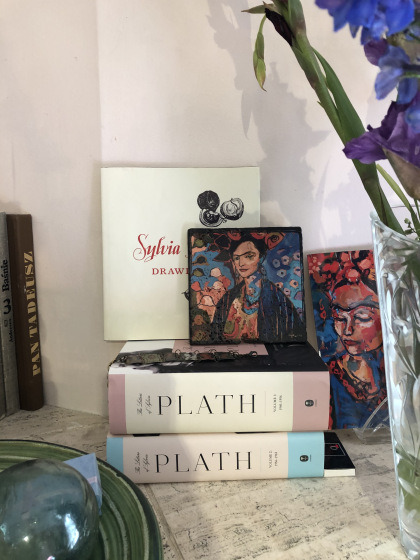
I don’t actually own Plath’s The Bell Jar or Ariel. How is this possible? Note to self: must buy. Response to self: this is how it beings, hoarding, pack-ratting expansion. Don’t do it. Response to response to self: Shut up. I want my Sylvia.
All of my Polish books:
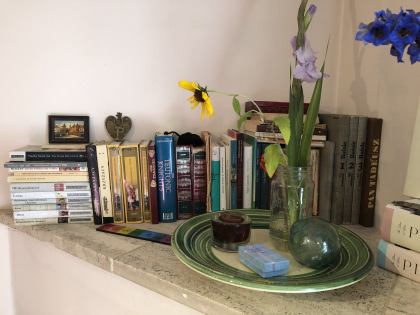
Some of these have travelled the world with my parents and me for almost forty years. The Polish translation of A.S. Lindgren’s Children from Bullerbyn (which used to belong to my dad’s sister, actually—she got it and read it the year I was born) and of Winnie The Pooh—the first “chapter” books I ever read. And, of course, Sienkiewicz, Mickiewicz, Orzeszkowa, Rodziewiczówna. Kapuścinski. The more modern poets: Zagajewski, Anna Świrszczyńska and Wisława Szymborska, not in translation.
This cultural heritage of mine, I have a very… fraught, complex relationship with. So much beauty, so much passion, so much suffering—so much stupidity, so much pain.
Governments do not define a national, a culture, or a people, I suppose. But in a democracy, they reflect the will and the hearts of the majority of the people, and, if the current government of Poland reflects the majority of the will and the hearts of the (voting) Polish people, they are repugnant to me and I want nothing to do with them. I am ashamed of them, of where I come from.
But I do come of them, from there, do I not?
Still. I keep the books. Including the one celebrating our first modern proto-fascist, Józef Piłsudski. History is complicated; ancestry not chosen.
Next, a shelf of all of my favourites.

All of Jane Austen, of course. Most of Nabokov. Virginia Woolf, because, well, it’s complicated. Susan Sontag’s On The Suffering of Others, and E.M. Forester’s Maurice—I gave up Room With a View and the others. J.D. Salinger’s The Catcher in the Rye, not so much because I’ll ever read it again but because it was so important back then. Anthony Burgess’ A Clockwork Orange, because nothing like it has been written before or since. Hunter S. Thompson’s Fear and Loathing in Las Vegas—I mean. I had to keep it, hero of my misspent university youth. I put him right next to Charles Bukowski’s Women, which isn’t great, but which… well. It taught me a lot about writing. Then, Jorge Luis Borges’ The Book of Imaginary Beings, which always makes me cry because a) it exists and b) I will never write that well.
Edward Said’s Orientalism, the only book to survive my “why the fuck did I keep all of these outdated anthropology and sociology and history textbooks for 25 years” purge. Margaret Mead’s New Lives for Old, which wasn’t one of them, but a later acquisition, kept in honour of the woman who dared live her life, do her thing. She wasn’t the smartest, the brightest, the most original—but fuck, she dared. Fraser’s The Golden Bough and Lilian Faderman’s Chloe Plus Olivia, both acquired in my teens—the first gave me religion for a while, while I freed myself of the Polish Catholicism in which I grew up (“freed” is an aspirational word; I suspect the religions we are indoctrinated into in childhood stay in our bones forever—the best that we can do is be aware when that early programming tries to sabotage our critical thinking and emotional well-being), and the second showed me I wasn’t a freak, an aberration, alone.
Next, The First Ms. Reader and the Sisterhood is Powerful anthology—original 1970s paperbacks bought in a used bookstore in the 1990s when I was discovering feminism. Monica Sjöö and Barbara Mor’s The Great Cosmic Mother—I suppose another Wicca-feminism vestige. I will never read it again, but way back when, that book changed my life, so. Here it is, with me, still.
And now, back to fiction: The Doorbell Rang, my only Rex Stout hardcover, although without the dust jacket, and a hardcover, old, maybe even worth something, with protected dust jacket intact, of P.G. Wodehouse’s Psmith, Journalist. Next to them, The Adventures of Romney Pringle and The Further Adventures by Romney Pringle, the single collaboration between R. Austin Freeman and John J. Pitcairn under the pseudonym of Clifford Ashdown. Written in 1902 or so, both volumes are the first American edition. In mint condition. Like the P.G. Wodehouse—and The Letters of Sylvia Plath, and the unique, autographed, bound in leather made from the butts of sacrificed small children or something, Orson Scott Card Maps in the Mirror short story collection, which is next-but-one to them on the bookshelf—they were a gift from Sean.
A lot of the books on my shelves, here with me now, are a gift from Sean.
Between them, a hard cover Georges Simeon found at a garage sale, and then G.K. Chesterton—Lepanto, the poem about the 1571 naval battle between Ottoman forces and the Holy (that’s what they called themselves) League of Catholic Europe, which I will never read again, but which is associated with a specific time and event in my personal history, so I keep it. Next to it, The Collected Stories of Father Brown, in battered hardcover, which I re-read intermittently, and which are—well. Perfect, really. Then, all of Dashiell Hammett in one volume. Then, almost all the best Agatha Christie’s in four “five complete novels” hardcover collections, topped with two multi-author murder mystery medleys from the 1950s.
Looking at this shelf makes me very, very happy.
Next, the one fully preserved collection. Before the move, these books lived on a bookshelf perched on top of my desk. Now, they are here, their “natural” order slightly altered because of the uneven height of this case’ shelves. The top shelf is, I suppose, mostly reference and writing books:
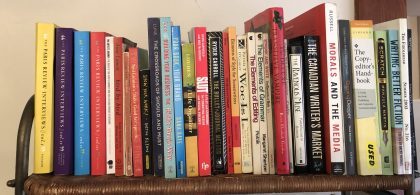
The Paris Review Interviews, Anne Lammott’s Bird by Bird, Neil Gaiman’s Make Good Art, Strunk and White’s The Elements of Style, and their ilk. At the end, a couple of publications in which I have a byline.
The next shelf, the smallest on the case, is a bit of a smorgasboard, but is very precious to me:
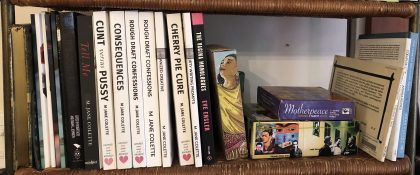
Do you see Frida and my Tarot cards? Also an Ariana Reines book that I really should give back to its owner…
Next, my perhaps most precious books.
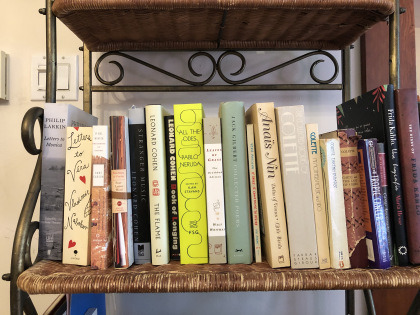
Philip Larkin’s Letters to Monica and Nabokov’s Letters to Vera. Anne Carson’s If Not Winter: Fragments of Sappho. Four Letter Word, a collection of “original love letters” (short stories, they mean, pretentious fucks) from an assortment of mega-stars, including Margaret Atwood, Leonard Cohen, Chimamanda Ngozi Adichie, Neil Gaiman, Ursula K. LeGuin… a strange assortment, really. But some lovely pieces in there. Some lame ones too—and I like that too. Even superstars misfire, every one in a while.
Then, Leonard Cohen, Pablo Neruda, Walt Whitman, Jack Gilbert, Vera Pavlova. Finally, Anaïs Nin’s Delta of Venus and Little Birds, and a bunch of battered Colettes. Henry Miller’s Tropic of Cancer right next to Colette, of course. Then, my Frida books.
The next shelf is full of aspirational delusions.
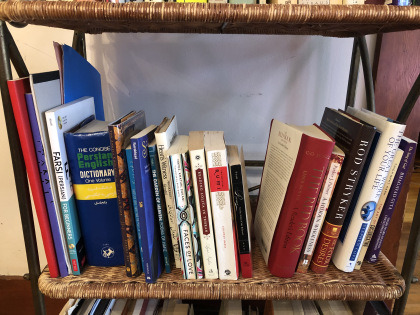
Farsi textbooks next to Hafez, Rumi and Forough Farrokzad translations. I will never be able to read Hafez in the original Persian. But maybe? Life is long. Maybe, one day, I will have time. Then, Jung’s Red Book, Parker J. Palmer’s A Hidden Wholeness, Rod Stryker’s The Four Desires, Stephen Cope’s The Great Work of Your Life, Thich Nhat Hahn’s The Art of Communicating (I failed), The Bhagavad Gita (still trying).
As I said, the shelf of delusions.
The bottom shelf is aspirational/inspirational, and also, very tall.
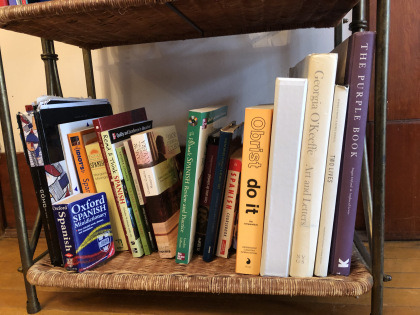
And so, that’s why my Georgia O’Keefe books are there, as well as The Purple Book, and Obrist’s do it manifesto. Perhaps there is room there for my leather-bound Master’s thesis, currently tucked away in the closet, right there, next to a course binder from SAIT? Then, all of my Spanish books, including Gabriel Garcia Marquez’s El Amor en los Tiempos del Cólera… which, also, one day, I will read in Spanish and actually understand. Life is long, right?
Next, not really a book shelf as such, but the top shelf of my secretary desk, where the reference and project books of the moment live.

The Canadian Press Stylebook has a permanent home here, of course. And I’ve got two copies of Canadian Copyright: A Citizen’s Guide there, one for me (unread, but I’ll get to it, I promise myself, again), one for a colleague. Both snagged from a Little Free Library, by the way.
Almost done.
In the bedroom, the books of vice.
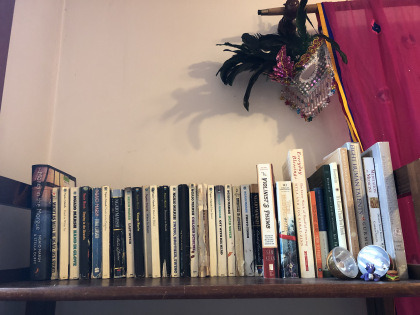
A shelf of battered Ngaio March paperbacks, tucked beside them some meditation and Kundalini yoga books that I’m not using right now, but, maybe, one day, I am not ready to give up on this part of myself yet. Below, a shelf of even more battered Rex Stout paperbacks.
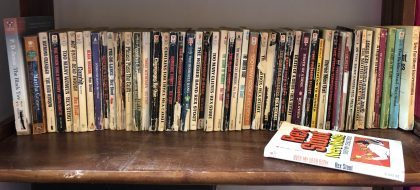
I read and re-read these books—as did their original owners—until they fall to pieces. They are my crack, my vice—also, my methadone, my soother.
Below them, space for library books, mine and Ender’s:
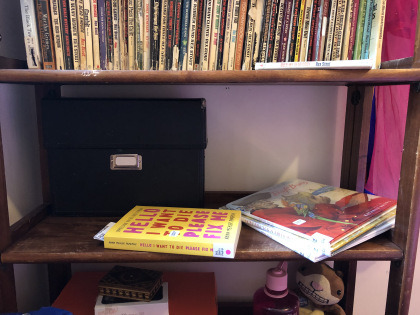
I am finding Anna Mehler Paperny’s Hello I want to Die Please Fix Me unreadable, by the way. I pick it up, put it away. Repeat.
Will likely return it to the library unread.
Currently not on display: books by friends. Some here with me, some on the shelves in the Co-op house. There are a lot of those. Can one be ruthless… with friends?
ii. A reflection
Books, for readers and writers, are the artifacts that define us. When I enter a reader’s home, I immediately gravitate to their bookshelves. What’s on them?
What’s not on them?
What I’ve chosen to let go of, to not bring with me here tells me… a lot.
What am I going to do with this information?
xoxo
“Jane”
Books in the Time of Corona: what’s on my shelves and what’s not, and the story it tells First, an apology for the title slug. I know you're all sick and tired of plays on…
0 notes
Text
Neruda: A Passion for Life
New Post has been published on https://sanwaldeen.com/journal/2020/03/11/neruda-a-passion-for-life/
Neruda: A Passion for Life
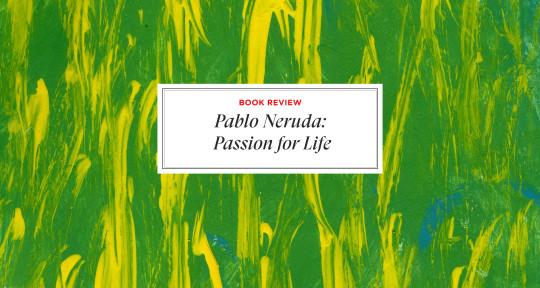
[vc_row row_height_percent=“0” override_padding=“yes” h_padding=“2” top_padding=“2” bottom_padding=“0” overlay_alpha=“50” gutter_size=“3” column_width_percent=“100” shift_y=“0” z_index=“0” shape_dividers=“”][vc_column column_width_percent=“60” gutter_size=“3” overlay_alpha=“50” shift_x=“0” shift_y=“0” shift_y_down=“0” z_index=“0” medium_width=“0” mobile_width=“0” width=“1/1”][vc_column_text]
Reading a biography is always an unusual experience; to think that a person’s entire life can be churned into a dense collection of words and folded between two pieces of cheap paper, even a life as eventful and dramatic as Pablo Neruda’s. It is an experience that is both humbling and unnerving, for it makes one reflect on one’s own life.
[/vc_column_text][/vc_column][/vc_row][vc_row row_height_percent=“0” override_padding=“yes” h_padding=“2” top_padding=“0” bottom_padding=“0” overlay_alpha=“50” gutter_size=“3” column_width_percent=“100” shift_y=“0” z_index=“0” shape_dividers=“”][vc_column column_width_percent=“60” gutter_size=“0” overlay_alpha=“50” shift_x=“0” shift_y=“0” shift_y_down=“0” z_index=“0” medium_width=“0” mobile_width=“0” width=“1/1”][vc_column_text]
Pablo Neruda was born Ricardo Eliecer Neftalí Reyes Basalto in Parral Chile, where “the vines curled their green head of hair.” His mother died two months after his birth; her grew up with his grandparents; then lived whit his stepmother; went to Santiago for college; joined the government so he could travel; traveled to Rangoon in Burma; then India, before removing to Spain where he helped refugees escape to Chile from Franco’s fascist regime during the Spanish civil war; went back to Chile; was exiled for his communist ideals poems and writing; lived as a fugitive and returned to Chile a hero; died in Chile because of cancer, during a U.S. sponsored military coup that ended up taking thousands of innocent lives and placed a dictator in office that was two rule Chile for over a decade.
Through his life, Neruda taught me what being an artist means:
[/vc_column_text][/vc_column][/vc_row][vc_row][vc_column column_width_percent=“55” gutter_size=“0” overlay_alpha=“50” shift_x=“0” shift_y=“0” shift_y_down=“0” z_index=“0” medium_width=“0” mobile_width=“0” width=“1/1”][vc_column_text]
The quality and texture of his work was perpetually changing. He kept playing and experimenting with different styles, techniques, and ideas, making the entire body of his work rather uneven. Critics hated this, but Neruda didn’t care. Sepulveda, the best-selling Chilean novelist even wrote:
” I share Borges view of Neruda that he was uneven. All poets are uneven, of course, but Neruda’s poetry underwent some peculiar leaps. How could the same man write both “El hondero entusiasta” and the “Odas elementales?”
To me, this willingness to experiment and contradict himself is precisely the reason Neruda’s work is so refreshing. He wasn’t afraid to disprove or question himself ideologically or stylistically, despite his fame. His constant play and experiment are precisely what enabled him to go from writing poems of love to starting a revolution.
[/vc_column_text][/vc_column][/vc_row][vc_row unlock_row_content=“yes” row_height_percent=“0” back_color=“color-914157” overlay_alpha=“50” gutter_size=“3” column_width_percent=“100” shift_y=“0” z_index=“0”][vc_column column_width_percent=“50” gutter_size=“3” overlay_alpha=“50” shift_x=“0” shift_y=“0” shift_y_down=“0” z_index=“0” medium_width=“0” mobile_width=“0” width=“1/1”][vc_single_image media=“90743” media_width_percent=“100”][vc_custom_heading heading_semantic=“h6” text_font=“font-767115” text_size=“bigtext” text_weight=“100” text_color=“color-200557” separator=“over”]“This is the poetry we should be after, worn away, as if by acid, by the labour of hands, impregnated with sweat and smoke, smelling of lilies and of urine, splashed by the variety of what we do, legally or illegally. A poetry as impure as old clothes, as a body, with its food stains and its shame, with wrinkles, observations, dreams, wakefulness, prophecies, declarations of love and hate, stupidities, shocks, idylls, political beliefs…“1[/vc_custom_heading][vc_column_text]
Perhaps that is as true for life as it for poems.
[/vc_column_text][/vc_column][/vc_row][vc_row][vc_column column_width_percent=“55” gutter_size=“0” overlay_alpha=“50” shift_x=“0” shift_y=“0” shift_y_down=“0” z_index=“0” medium_width=“0” mobile_width=“0” width=“1/1”][vc_column_text]
He was poor for the majority of his life, even when he became a famous and successful poet. The necessity of living-paying bills. Renting an apartment—that was paid for by his “day job” as a senator. A position he hated for the majority of his life. But he didn’t let the mundane regularity of daily life get to his creative spirit. He continued to write, experiment and read every day just to keep his soul nourished. Even when he was a fugitive, he continued to write in dark closets and unlit spaces, letting his words convey the light.
He stood up for what he believed in, even when it means that he would lose his job and freedom. He died a disillusioned man; as a communist, he was shocked when he learned about Stalin’s crimes and having seen the effects of the US invasion of Latin countries and Vietnam (directly or through proxy) made him wary of capitalism. Despite the disillusionment from politics, he kept fighting for the rights of everyday workers till his dying breath. Even when it meant going to jail or facing torture. Neruda never sacrificed his ideals.
Even at the lowest points of his life, he never lost the passion for living. He kept throwing parties and meeting with friends, even when he was in danger of being thrown in prison He didn’t let fear conquest his life or art.
He had an extensive library collection and loved to read. But he wasn’t reading books on about books; he was reading to be inspired. At the ceremony at the Universidad de Chile on 20 June Neruda exclaimed: ‘I’m not a thinker, and these collected books are more reverential than investigative.”
He learned early on in his life to look at the world through symbols. Growing up in a pioneer town where no one spoke the same language, the shops around him were strewn with symbols instead of words. So instead of seeing J.B Hardware company, you would see a giant hammer; a cobbler’s shop would be represented with a shoe; and so on. The world around him was all represented in symbols rather than words, much like his poetry.
He never lost his sense of playfulness and humor. As he was fleeing Chile on a horse, crossing the mountains while every cop in the country looking for him, he saw a tree and was inspired to write a note to his hunter:
“How good the air smells In the Lilphela Pass Because the shit has not yet arrived From traitor consoles Videle’s ass.”
He loved writing and creating art for art’s sake. Of course, he enjoyed fame and lavished in it; but at the beginning of his writer’s life, he had to fight his father and alienate himself from his family to pursue art. Later on, people tried to box him as a “love” poet or a “revolutionary” poet but he still kept evolving and changing; even when the critics wrote about how terrible his work was. He kept his eyes on his writing.
[/vc_column_text][/vc_column][/vc_row][vc_row row_height_percent=“0” override_padding=“yes” h_padding=“2” top_padding=“0” bottom_padding=“0” overlay_alpha=“50” gutter_size=“3” column_width_percent=“100” shift_y=“0” z_index=“0” shape_dividers=“”][vc_column column_width_percent=“60” gutter_size=“0” overlay_alpha=“50” shift_x=“0” shift_y=“0” shift_y_down=“0” z_index=“0” medium_width=“0” mobile_width=“0” width=“1/1”][vc_column_text]
Neruda’s favorite color was green. He thought it was the color of hope and life. And so, he always wrote in green ink. His life, like there color green, has given me hope. Hope that despite all the challenges that life throws at us, we need to keep the child in ourselves alive and keep moving forward, with courage and love.
[/vc_column_text][/vc_column][/vc_row]
0 notes
Text
T6-Latin American Literature: Realism and Magical Realism

Introduction
In this week’s reading, we covered the genre of Magic Realism and realism in Latin American literature. We were introduced to Isabel Allende, Octavio Paz, Gabriel Garcia Marquez, Jorge Luis Borges, and Pablo Neruda. Magic realism is a mixture of realism and fantasy. The aforementioned authors use magic realism to blur the lines between reality and aspects of fantasy or folklore in order to bring light to matters like politics, society, democracy, and psychology.
In Class: Watch “What is Magical Realism?”
Death Constant Beyond Love by Garcia-Marquez
“While he was speaking, the senator had torn a sheet off the calendar and fashioned a paper butterfly out of it with his hands. He tossed it with no particular aim into the air current coming from the fan and the butterfly flew about the room and then went out through the half‐open door. The senator went on speaking with a control aided by the complicity of death.”
Garcia-Marquez utilizes magical realism in the form of these paper butterflies and magical paper creatures. The protagonist of this tale is Senator Onésimo Sánchez and he has recently discovered the exact date of this death. Magical paper butterflies are juxtaposed against death and this is where the magical realism Marquez is famous for, bursts into life. Sanchez speaks normally as the butterflies come to life, unaffected by this magic- seemingly because he has been affected by the knowledge of his death.
In Class: Watch Gabriel García Márquez: What To Know About The Master Of Magical Realism & Nobel Prize Winner
“Laura Farina saw the paper butterfly come out. Only she saw it because the guards in the vestibule had fallen asleep on the steps, hugging their rifles. After a few turns, the large lithographed butterfly unfolded completely, flattened against the wall, and remained stuck there. Laura Farina tried to pull it off with her nails. One of the guards, who woke up with the applause from the next room, noticed her vain attempt. "It won't come off," he said sleepily. "It's painted on the wall."
The magical realism aspect in such stories does not stand out against the everyday happenings as we would expect them to in real life. Laura Farina does not go on to question the paper butterfly once she enters the room with the Senator. She accepts it for what it is and moves on.
In the Classroom:
Activity 1: Magic Realism in Pop Culture
Pan’s Labyrinth by Guillermo Del Toro is considered one of the most successful examples of magical realism in film. Show Students the following videos with the background provided in this study guide on page 5.
Movie Trailer
Pan's Labyrinth and Magic Realism
Present the following quote from the second video to students and have them respond to the following question in a journal entry:
“We should view Ofelia’s magical narrative as the memories of the war time children , while the narrative of the war as history itself.”
How does the magic aspect (the Labyrinth) and the reality aspect (the war) relate to this week's readings?
Activity 2: Reading and warm-up activity
Have students reflect on the following article about writing magical realism:
https://www.writermag.com/improve-your-writing/fiction/writing-magical-realism/
Warm-up: in the first ten minutes of class, have students come up with an idea for a magical realism story. Have a few students share their ideas with the class and discuss if it falls within Magical Realism or not.
0 notes
Note
I really really love your old Don't hug me I'm scared stories on Ao3, they are my very favorite to read. Do you have any tips for an aspiring writter? I'm only 14 but I really want to be a writter some day, I write a lot of fanfiction but I don't think they're very good and they never get more than one or two reads and never any comments. I'm not sure what I can do to improve myself. (Sorry I hope my English is okay.)
***
Thank you so much for your message! I’m gladto hear that you like my stories, and I’m very flattered to be asked for advice. It got me thinking, and I ended up writing out a LOT so I’m sorry for how long this is, but bear with me:
#1) Read Read Read. The only way tobe a good writer is to be a good reader.
That’s really my best advice for anyone. Read as much and as widely as you can.
***
Style & Language:
- Start in the middle of theaction (google in media res)
- The more you practice the moreyou’ll develop a voice of your own
- Think about tense (past orpresent?) and about point-of-view
- Who’s telling the story? Whatdo they know? What do they observe? What kind of vocabulary do they have andwhat does it say about their personalities? (e.g. Tony’s language is always morearchaic and formal than Paige’s, because he’s more uptight)
- Is your narrator reliable, orfooling themselves, or fooling the reader?
- Get a great opening sentence to catch the reader’s attention, and a closing sentence that gives some emotional closure to the story.
- Keep it simple, and keep yourdialogue believable. The best advice I read about that was a writer named SarahBunting saying that someone should be paid to sit down with writers and repeatand repeat the words People Don’t TalkLike That.
***
Characters & Plot:
“Every character should want something,even if it’s only a glass of water” – Kurt Vonnegut
- Make your audience do thework. Don’t spell everything out. Drophints. Instead of saying “Bob felt nervous and scared to speak up” say “Bobshuffled his feet and cleared his throat twice before speaking”
- That being said, if you dodrops hints, make sure they pay off later (see Chekov’s gun)
- The mood of the story is justas important as the plot. What kind of emotions do you want your readers tofeel? I’d say it’s more important for the reader to feel satisfied even ifthere are some plot holes.
- There are a lot of boring booksand movies where “the fate of the whole universe is at stake” – but if thecharacters don’t act like they care, neither will the reader.
- What’s more dramatic, a bombunder the table that explodes suddenly out of nowhere, or a bomb slowly tickingunder a table that only the audience knows about?
“Not “A happened, then B happened” but “B happened, because A happened””
- Film Crit Hulk
***
Some of your stuff you’ll like better thanothers. That’s fine. That’s normal. I’ve written lots of stuff I really don’t like. Youcan always put it away and write something new. Write one scene. One sentence that sticks in your mind. Have fun.
Don’t worryabout notes or reblogs. They don’t mean that you’re not talented.
A few resources:
Kurt Vonnegut’s 8 Rules for Writing
Film Crit Hulk This guy is a professional screenwriter and has some deep thoughts about language, plot, and how to craft stories. HIGHLY recommend.
Wired for Story I’m reading this book for work right now. Very useful.
Authors to Read:
- Yann Martel
- Agatha Christie (a master oftightly structured plots)
- Neil Gaiman
- Gabriel Garcia Marquez
- Jorge Luis Borges (read his short story The Library of Babel and let me know what you think)
- Guy Gavriel Kay (if you like beautiful, slightly sad and gorgeously written fantasy)
- Pablo Neruda (love poems that are achingly perfect and completely unsentimental)
- Shakespeare (still the very best)
Hope that’s useful, please feel free to come by and chat any time!
7 notes
·
View notes
Text
Thoughts from Below the Rio Bravo
By Fred Reed, September 4, 2017
To understand of many Mexican attitudes toward the United States and immigration, you have to go back to the Mexican-American War of 1846-48, of which most Americans have never heard. The United States attacked Mexico in a war of territorial acquisition, occupied Texas, California, New Mexico, and Arizona, and drove south to conquer Mexico City. It did it because it could.
The attitude of Americans who have heard of the war is usually, “Get over it.” Mexicans have not gotten over it. People get over things they have done to others more easily than they get over things others have done to them. Tell Americans to “get over” Nine-Eleven, or Jews to get over Germany.
There is in Guadalajara a large and prominent monument to Los Niños Heroes, the adolescent cadets who marched out to defend Chapultepec as the Americans conquered Mexico City, much as the VMI cadets tried to defend Virginia in the Civil War. Countless Mexican towns have a street called Niños Heroes. They remember.
This does not make for a keen appreciation of the Exceptional Nation. Nor does memory of the conquest arouse sympathy about immigration–or, as Mexicans see it, emigration. It explains the occasionally heard phrase, “La Reconquista.”
Throw in the drumbeat from racialist sites to the effect that Mexicans are stupid, filthy, criminal, and parasitic, and Trump’s asserting that they are rapists and what all, which resonates in Mexico as Hillary’s Deplorables speech did in Middle America. And of course there was the bombardment of Veracruz, of which Americans have never heard, and Pershing’s Incursion, and Washington’s history of attacks, invasion, installation of dictators in Latin America and support for others.
For Mexico, as for most of the world, the US is not the shining city on a hill that it thinks it is. Over and over it attacks other countries and invariably is surprised when they don’t like it. Note that America and its vassals in Europe kill huge numbers of people in Muslim cities, yet express outrage when Muslims kill people in their countries.
In America, conservatives will erupt in fury on reading the foregoing. Well, bully for them. The behavior of Mexicans is determined by their history and what they think, not by what others think they ought to think.
These days, people often want a philosophical framework to justify their aggression. Among the better educated of Mexico, emigration is sometimes intellectualized by saying that flows of population have occurred all through history, Rome and such. These flows, they say, are inevitable and perhaps favored by Divine Providence. They don’t quite say, “Get over it.”
This reasoning is self-serving. If twenty million Haitians swam ashore in Veracruz, Mexicans would not regard it as a natural and inevitable flow. Note, though, that the Mexican inevitable-flow theory precisely parallels the doctrine of Manifest Destiny, which held that that America’s expansion across the continent was inevitable. It was an early form of American Exceptionalism, the idea that America is special and need not follow norms of decent behavior. Now it seems that Manifest Destiny is reversible. This notion too will anger many Americans, but then, the invasion of Mexico angered many Mexicans.
American attitudes toward Latinos, chiefly contempt, do not get a rousing welcome here. Americans both north and south of the border tend to see Mexicans only as gardeners, waiters, maids and, here, a few English-speaking doctors. Typically they have no idea of the lands between the Rio Bravo and Tierra del Fuego. They have not been there, do not speak or read Spanish. Americans, increasingly losing their own intellectual tradition, are unaware that Latin America has its own rich intellectual history going back for centuries. Fortifying this blankness is the charming view that Latinos are stupid and so, obviously, cannot have an intellectual anything. This annoys Mexicans.
Latin America has in fact produced a great many writers of the first rank, not to mention philosophy, architecture, and music. Pick a few: Vargas Llosa, Garcia Marquez, Juan Rulfo, Pablo Neruda, Borges, Ortega y Gasset, Octavio Paz, Carlos Monsivais, Mario Benedetti, on and on. I didn’t know most of them either, but my wife Violeta, a Mexicana, does. All of this ties in with the literature and art of Spain, the mother country, just as ours does with that of England. There is a major civilization down here, despite the views of internet louts.
While there is much discussion of immigrants in the US, it consists mostly of ideology, of impractical hostility on the Right and moral preening on the Left. Neither seems to have much interest in knowing what it is talking about.
For example, the illegals, a source of horror, are mostly not diseased, drug-dealing rapists with drooping IQs and psychopathic murderousness. This will come as a disappointment to many. Actually, they come in flavors. They are not one thing.
At the negative end are the MS 13 types, tattooed killers. These could profitably be taken up in a helicopter and allowed to come down independently. Then you have the kid brought over at age two and who now, at nineteen, speaks perfect California English and horrible Spanish and thinks he is an American, never having been to Mexico. You have the guys who come for two, three, four years, save money, and return to Mexico to buy a house for their families.
You have our friend Rosa, I will call her, who came over illegally after high school, worked dirt jobs, found free English lessons, went briefly on welfare, and finally worked her way up to be head of food-services at a high school. (Incidentally, it annoys her that her kids do not speak Spanish, but, she says in flawless English, this is America, what do you expect. Many immigrants favor bilingual schooling so that their children can learn Spanish.) Anyway, after a few years she went to whoever you go to, said she wanted legal residence, was told she had to pay back the welfare, did, and is now a permanent resident in in line for citizenship if Trump doesn’t stop her.
Finally you have those illegals who live permanently on welfare and never learn English. When Rosa speaks of them, she sounds like Breitbart News: “I work. I pay taxes. Who do these damned….”
Now permit me once more to infuriate conservatives. It is a service. It will keep their blood flowing briskly: Consider Eduardo and Maria, Salvadorans living in San Salvador in a dirt-floored cinderblock hut. They have little money, not because they are stupid or lazy but because there are no jobs. Their two kids cry at night because they are hungry. Their only hope, they decide, is for Eduardo to try to get to the US, a ballsy and dangerous idea, send money back, and try to figure out how to get Maria and the kids into the US.
So he and Maria scrimp and do without–more without–and lean on relatives to get the money for a pollero to get him across the US border should he get that far. Eduardo sets off hitchhiking, which he has never done, up Central America to the Mexican border where the police or los maras are likely to beat and rob him. Mexico enforces its immigration laws more vigorously than does the US. He rides the Train of Death, well named, to the US frontier, where he doesn’t know anybody or anything and, if he is not robbed, finds himself in a country whose language he does not speak. Somehow he gets to Kentucky, picks tobacco, and sends money back.
It is not an undertaking for someone who has feathers for balls.
Yes, it is illegal. No, it is not good for the United States. Yes, immigration should be stopped. But–if you were Eduardo, which would matter more to you, your wife and children, or some law in a remote country where, in any event, a lot of people want you to come and work? What would you do? Would it not be irresponsible not to do it?
I will now go into hiding.
1 note
·
View note